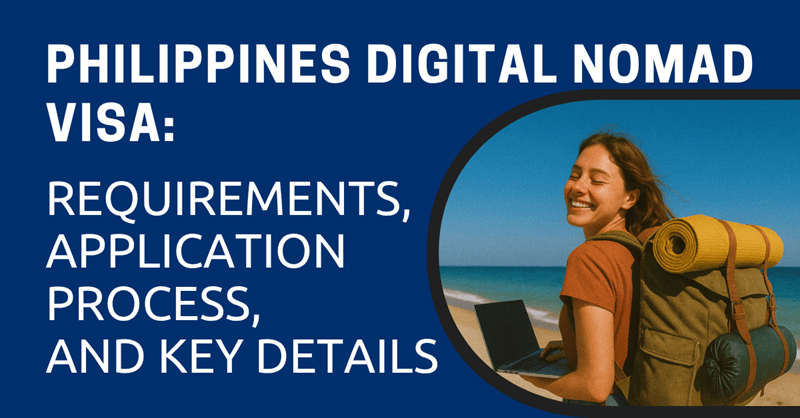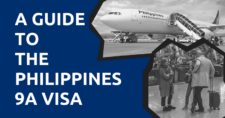
This article will take approximately 8 minutes to read. Don't have the time right now? No worries. Email the ad-free version of the article to yourself and read it later!
Everything You Need to Know to Work Remotely from the Philippines
The Philippines is another country in Southeast Asia, after Thailand, that is about to release a digital nomad visa.
With this visa, remote workers and digital nomads can live and work legally for up to two years. This means no more doing visa runs with a tourist visa. While the visa has not been officially released yet, it is expected to launch in June 2025.
In this post, you’ll find everything you need to know about the Philippines digital nomad visa, including the requirements, necessary documents, and step-by-step application process.
**As of July 2025, the Philippines’ Digital Nomad Visa has been officially authorized and was scheduled to launch in June–July 2025. Applications are now open or opening imminently. We will update the article with official application links and details as soon as they’re released.
Disclaimer: This article may include links to products or services offered by ExpatDen's partners, which give us commissions when you click on them. Although this may influence how they appear in the text, we only recommend solutions that we would use in your situation. Read more in our Advertising Disclosure.
Contents
- Key Takeaways
- What Is the Philippines Digital Nomad Visa?
- The Philippines Digital Nomad Visa Requirements
- Required Documents
- How to Apply
- Launch Timeline
- Restrictions
- Frequently Asked Questions
- When can I apply for the Philippines Digital Nomad Visa?
- Can I work for a Philippine company while on this visa?
- Do I need to pay personal income taxes in the Philippines?
- Can I bring dependents or family members?
- Can I convert this visa to permanent residency?
- Can I travel in and out of the Philippines while on this visa?
- Pros and Cons of Being a Digital Nomad in the Philippines
- Should I Get a Philippines Digital Nomad Visa?
Key Takeaways
- The Philippines is planning to release a digital nomad visa in the last week of June 2025.
- The visa allows you to stay in the Philippines for up to 2 years.
- Proof of being a digital nomad, income requirements, and health insurance are the three main requirements. However, we still need to wait for the exact required amounts.
- With the Philippines Digital Nomad Visa, you can continue your remote work as long as it’s not for a Philippines-based company.
- You also cannot work for a company in the Philippines.
- You should be able to apply for the visa online. We will wait for confirmation from an official source.
What Is the Philippines Digital Nomad Visa?
The Philippines Digital Nomad Visa is a new visa program that allows remote workers and digital nomads to live and work legally in the Philippines.
It basically works the same as digital nomad visas in other countries:
- You can live in the Philippines legally.
- The visa is initially valid for 1 year. Then, you can renew it for another year, giving you a total stay of 2 years. After that, it’s expected that you should be able to apply for or renew a visa, assuming you fulfill all the requirements.
- You can work for an overseas company or run an online business, as long as it’s with international clients
The Philippines Digital Nomad Visa Requirements
Below are the main requirements for the Philippines Digital Nomad Visa. They are similar to digital nomad visas in other countries.
Please note that the information is broad at the moment, as Philippine officials haven’t released specific requirements yet. We will update this section once they do.
- Age requirement: You must be at least 18 years old.
- Proof of work: You must work remotely for an overseas employer or run an online business for international clients.
- Income requirement: You must demonstrate sufficient income to support yourself during your stay. The specific amount hasn’t been announced yet.
- Country eligibility: You must come from a country with diplomatic relations with the Philippines. Basically, this includes most countries in the world except a few, such as North Korea and Syria.
- Criminal background: You must have a clean criminal record.
- Health insurance: You must have valid health insurance that covers your entire stay in the Philippines.
Please note that requirements may vary slightly depending on your nationality and the specific Philippine embassy or consulate processing your application.
Required Documents
While the official document list hasn’t been published yet, here are the expected documents you’ll need for the Philippines Digital Nomad Visa:
- Passport: Valid for at least 6 months with blank pages for visa stamps.
- Remote work proof: Documentation showing your remote work arrangement, such as employment contracts, freelancer contracts, or portfolio.
- Income verification: Bank statements, payslips, tax returns, or other documents proving sufficient income to support your stay.
- Health insurance policy: Health insurance coverage that includes medical treatment in the Philippines.
- Criminal background check: Police clearance or background check from your home country.
- Completed application form: The official form will be available once applications open.
Each Philippine embassy, consulate, or immigration office may require slightly different documents, so it’s important to confirm the requirements with them before submitting your application.
How to Apply
The application process is still being finalized, but here’s what we expect:
- Online applications: Most applications will likely be submitted through the Philippines eVisa website
- Embassy applications: You may also be able to apply in person at Philippine embassies or consulates in your home country.
- Processing location: The exact processing centers haven’t been announced, but major Philippine embassies and the Bureau of Immigration in Manila will likely handle applications.
- Fees: Application fees haven’t been published yet. We’ll update this section once official fee structures are released.
- Processing time: The government hasn’t specified processing times, but based on other visa programs, expect 2–4 weeks for standard processing.
Launch Timeline
As of now, applications for the Philippines Digital Nomad Visa are not yet open, but they’re expected to launch by June 23, 2025.
Restrictions
The only restriction we know so far is the employment restriction: you cannot work for a company in the Philippines while holding this visa. This is a common restriction for digital nomad visas around the world.
Frequently Asked Questions
When can I apply for the Philippines Digital Nomad Visa?
Applications should open by June 23, 2025.
Can I work for a Philippine company while on this visa?
No, you cannot work for Philippine-based companies. Your remote work must be exclusively for overseas clients or employers.
Do I need to pay personal income taxes in the Philippines?
While this has not been officially confirmed, it’s highly likely that your personal income won’t be taxed in the Philippines as long as it is earned abroad.
Can I bring dependents or family members?
We don’t know yet. We will update this section once we hear more from an official source.
Can I convert this visa to permanent residency?
It’s unlikely that you can convert it to permanent residency or other immigration statuses.
Can I travel in and out of the Philippines while on this visa?
This hasn’t been specified yet, but most digital nomad visas allow multiple entries. Confirmation will come with the detailed regulations.
Pros and Cons of Being a Digital Nomad in the Philippines
If you are still deciding whether or not you want to be a digital nomad in the Philippines, here’s a quick list of pros and cons:
Pros:
- Hassle-free visa: There’s no more visa run. You can now live in the Philippines for up to 2 years.
- English-speaking environment: This is one of the best parts about the Philippines. Almost everyone speaks English well, making communication easy.
- Low cost of living: Your money goes further here. You can live comfortably for less than US$1,000/month.
- Growing digital nomad community: Major cities like Manila, Cebu, and Siargao have established co-working spaces and nomad communities.
- Tropical lifestyle: Access to beautiful beaches, islands, and outdoor activities year-round.
Cons:
- Infrastructure challenges: Outside of major cities, there are problems with internet speed and stability. There are also regular power outages, known as “brownouts.”
- Unclear tax implications: The tax situation for digital nomads hasn’t been clarified, creating potential complications.
- Weather concerns: Typhoon season and high humidity may not suit everyone’s preferences.
- Bureaucratic processes: Philippine government processes can sometimes be slow or require multiple visits to complete.
- Safety concerns: Overall safety isn’t as good as in nearby countries like Thailand or Malaysia.
Should I Get a Philippines Digital Nomad Visa?
It’s too early to say, as we still need to wait for the specific income requirement to be announced. If it turns out to be reasonable, then yes, you should consider getting it if you plan to be a remote worker here.
The affordable cost of living, English-speaking environment, and growing digital nomad communities in the Philippines are what make the country appealing to digital nomads.
Related article: Thailand Destination Thailand Visa (DTV): Requirements and Application in 2025







